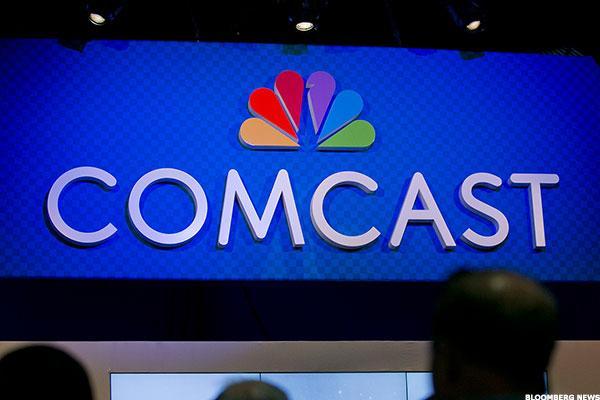As global media titans like Comcast, Disney and Rupert Murdoch do ferocious battle, someone needs to be looking out for the consumer’s interest
It’s reasonable to be suspicious when the same company potentially provides your home broadband, streams your content, creates that content and also provides your news


Your support helps us to tell the story
From reproductive rights to climate change to Big Tech, The Independent is on the ground when the story is developing. Whether it's investigating the financials of Elon Musk's pro-Trump PAC or producing our latest documentary, 'The A Word', which shines a light on the American women fighting for reproductive rights, we know how important it is to parse out the facts from the messaging.
At such a critical moment in US history, we need reporters on the ground. Your donation allows us to keep sending journalists to speak to both sides of the story.
The Independent is trusted by Americans across the entire political spectrum. And unlike many other quality news outlets, we choose not to lock Americans out of our reporting and analysis with paywalls. We believe quality journalism should be available to everyone, paid for by those who can afford it.
Your support makes all the difference.For many decades, giant American cable companies possessed what seemed like a licence to print money.
By bundling their exclusive blockbuster entertainment content such as live sports with other programming, which was still desirable but which had less mass appeal, they could effectively compel customers to purchase expensive all-in cable subscriptions. The profit margins were extraordinarily plump.
Then along came Silicon Valley and spoiled the party.
By offering relatively cheap online streaming services like Netflix and Amazon Prime, these newcomers created a business model with the potential to destroy the cable empires.
Why buy an expensive cable cord subscription when you can simply use your broadband connection to access your home entertainment through your internet-ready TV, or your computer, or your tablet, or even your phone?
And what if those cash-rich Silicon Valley companies started to seriously compete in bidding wars for those desirable exclusive sports, movie and TV content rights, currently in the hands of the cable companies? What if they started to make the content themselves by establishing studios?
The mass “cord cutting” by Americans, long forecast by industry analysts, hasn’t begun yet. Americans are slow to change their habits. Many have Netflix alongside their cable packages.
Yet it’s still clear which way the content wind is blowing, especially with younger “digital natives” far less likely to be in the habit of subscribing for cable.
So how do the cable companies respond? If you can’t beat them, join them, is one option. Why not buy smaller digital streaming companies and beef them up into potential rivals to the big Silicon Valley players?
Some cable companies have already diversified, acquiring content creators such as movie studios and news networks. They could leverage that exclusive content to serious challenge the incumbents in the battle for digital subscribers.
That was likely a significant motivation for Disney’s recent $66bn (£47.5bn) bid for 21st Century Fox.
Another tactic for the cable leviathans is simple acquisitions: get even bigger and expand into new cable markets abroad. Control more broadband distribution networks.
Large revenues means larger cash flows, which means more investment firepower for new content production and bidding wars for content rights.
That’s how best to understand Comcast’s dramatic attempted gazumping of 21st Century Fox’s bid for Sky today.
Where is the public interest in all this? The focus here in the UK in relation to the Sky takeover battle has, understandably, been on preserving the plurality of the UK news media environment.
Such concerns fell away somewhat when Rupert Murdoch agreed to sell the majority of his 21st Century Fox business to Disney. Unlike Murdoch, the home of Mickey Mouse doesn’t already control any major British news brands.
And there are no obvious news plurality issues in relation to Comcast, the company behind a couple of large US news broadcasters, owning Sky News. MSNBC is not a big influencer of public opinion on these shores.
It’s possible there might even be more welcome investment in UK TV news if the deal goes through.
Yet there are, nevertheless, grounds for concern.
Competitive and dynamic as the Western world’s media landscape seems on the surface, size still confers power – both commercial and political.
It’s reasonable to be suspicious when the same company potentially provides your home broadband, streams your content, creates that content and also provides your news. There are a lot of potential barriers to customers switching there. Or it’s possible to imagine them being erected.
It’s perhaps not a coincidence that, as well as having the largest revenues among media companies in America, Comcast is also one of the firms most complained about by consumers.
This ferocious global battle among giant multinational media and technology conglomerates for content and distribution networks can feel like a remote drama peopled by stupidly-rich oligarchs, moguls and financiers. Perhaps a fitting subject for a new Netflix drama. Fetch the popcorn.
But make no mistake: what these titans are all battling over is our attention and access to our wallets. And it’s essential that our interests as consumers are adequately safeguarded by regulators.
Join our commenting forum
Join thought-provoking conversations, follow other Independent readers and see their replies
Comments